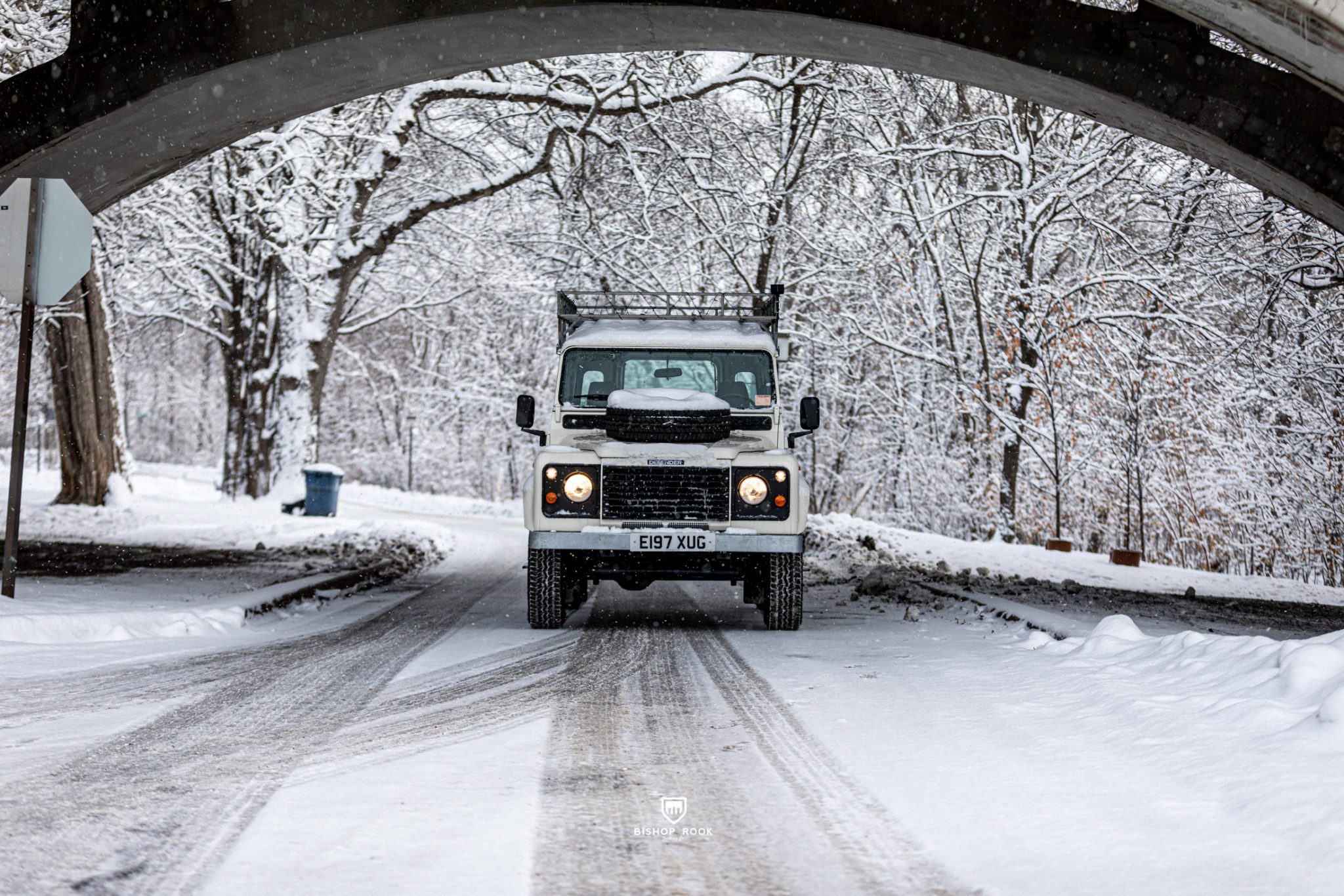As a part of our Defender Rescue YouTube film series, we featured Project Toto – a one-owner 1987 Land Rover 110 LHD with a very interesting history. We debated how much we would share in the public vs. what we would simply hand off to the new caretakers. In the end, it was such a great story that we wanted to share at least parts of it in the public domain.
Project Toto was built in Solihull, England, and subsequently shipped to Nigeria, where the original owners used her to explore Africa before overlanding back home five years later. We immediately fell in love. Upon further research, we found quite a bit of paperwork and documentation that came with the vehicle – 35 years of records, including the original bill of sale, shipping manifests, and official diplomatic paperwork.
As we acquired the Land Rover through a secretive process of using a broker on behalf of the family, we didn’t originally know the whole story. Driven by our curiosity, we began our search for the true provenance of the vehicle. We were not disappointed.

 Without sharing too many personal details in public about the previous owners, we are publishing a reprint of the article below written by the gentleman who originally purchased Toto in 1987. He had a long and distinguished career working around the world – spending seven years as a member of Her Majesty’s Overseas Civil Service, the successor to the Colonial Service, from 1960 to 1967, followed by twenty-three years on the staff of the World Bank.
Without sharing too many personal details in public about the previous owners, we are publishing a reprint of the article below written by the gentleman who originally purchased Toto in 1987. He had a long and distinguished career working around the world – spending seven years as a member of Her Majesty’s Overseas Civil Service, the successor to the Colonial Service, from 1960 to 1967, followed by twenty-three years on the staff of the World Bank.
Featured in “Bank’s World,” June 1992
Relocation with a Difference
When I joined the Nigeria Resident Mission in 1987, I acquired a four-wheel drive vehicle so my family and I could visit as much of the country as possible during the course of our stay there. By the time we left Nigeria, the vehicle had been driven over 100,000 kilometers. We had visited most of the country, including the wet areas of the Niger Delta, the desert areas in the north of Bornu, mountains on the borders of Cameroon and large areas of the savannah zone. I had bought large scale maps which enabled us to leave the made-up roads, penetrating into areas not often visited by outsiders. We had always had it in mind to drive the car across the Sahara desert to Europe at the end of our stay in Nigeria, and so we did.
My wife and I, our daughter, Carolyn and son, Timothy, left Lagos December 13, 1991. The previous night we had held a party for our friends on a cruise boat. A gremlin had entered the engine and the boat never left the quayside, though the party was a success anyway. On the journey to Europe we were to be joined by the Lagos manager of Lufthansa and his wife, both German, a Dutch resident of Lagos, his two children and brother-in-law who, fortuitously as it turned out, owned a Making friends while camping in the Air Mountains.
string of tire outlets in Holland. We all drove Landrovers and the first day was a somewhat long journey on the familiar road from Lagos to the new Nigerian capital of Abuja. In Kano, we picked up three of the Dutch party and then drove on to Sokoto, where the party was completed with the arrival of the German contingent. My wife had the misfortune to be arrested there for allegedly taking a photograph of the Sultan’s palace. Though others had, she had not done so, but it took two hours to extricate her!
We drove through Niger, stopping at Tahoua and Agadez, with its attractive old mosque, and spent two nights camping in the Air Mountains. Until Agadez, the Harmattan, a cool dustladen northerly wind, had been blowing. Beyond, the air was clear and warm by day and clear and cold by night. From Arlit our route took us over the desert tracks to Tamanrasset in Algeria. The route is marked by balises, but the track may be ten or more kilometers wide; there is no made-up road. At night, we drove off the track, below the horizon, in order to camp. We had had some vehicle problems, but all went well in this remote area. We arrived at Tamanrasset late December 23. We spent Christmas Eve there and set off Christmas morning for Assekrem in the Hoggar mountains, to visit the hermitage founded by Pere de Foucaud in the early part of this century.
From there we intended to observe the sunrise and sunset over the magnificent and stark mountains. We camped six kilometers short of Assekrem as the sun was setting, with rose-colored peaks on all sides. We had seen a number of other visitors camped along the track. We ate Christmas dinner, somewhat modified by the limitations of our cooking facilities and the cold, which forced us into bed at an early hour. Some of us slept in tents, some in the cars and Timothy in the open.
 A gun at his back
A gun at his back
Timothy was the first person to hear our visitors at 4 a.m. On greeting them, he was forced to the ground with a gun at his back, though he was able to warn the bandits that there were young children in the party. I was forced at gun point to yield up our money and keys of the car, as were the Dutch and German parties. Curiously, the bandits rejected travelers cheques-American Express, please note! Though I could have seized one of the guns at one point, in the dark I didn’t know the situation of the others in the party, nor the number of our assailants. Finally, after slashing the tires of the other two vehicles and throwing into our car various items that took their fancy, the bandits drove off in our Landrover. Their last request was to know if it ran on petrol or diesel! Noone had been hurt. The Ducker family had been left with what they wore, the tent, one bag of clothes, a hurricane lamp and our travel papers. The others were more intact, though all the money had gone together with camera equipment, sleeping bags, etc. We estimated there were between five and eight bandits in the party. They were garbed in the traditional dress of the Tuareg, and obviously not new to this game.
The temperature was now -9°C, and Our main concern was keeping warm until the Silll came up and we could see better. We could still make a hot drink and had some food left. As soon as possible, we set about repairing the 10 slashed tires which was when our Dutch tire specialist came into his own. Aroillld 8 a.m., a vehicle came past and I was able to get a lift to Tamanrasset to report to the gendarmerie. On the way, we were stopped by two Spaniards who had been robbed by the same gang, and also had their tires slashed. It took four hours to reach the town. The rest of the party caught up with me five hours later.
New Year’s Eve
The gendarmerie was keen to help but busy with the elections, which resulted in victory for the Islamic Fundamentalist Party. Over the next two days, we made our reports and received leave to depart, the German and Dutch parties by car, ourselves by air to El Golea, Algiers, Paris and London, where we arrived on New Year’s Eve.
A month later, back in Lagos again, I was informed hy the British Consul in Algiers that the gendarmerie had recovered our car (it was found in a ravine by a shepherd) and we were free to collect it at any time. As fortune would have it, we were due to leave Nigeria February 15, so we arranged to go to Algeria as soon as we could. By then, the Algerian government had declared a state of emergency as they grappled with the consequences of the elections, but the Algerian officials in Lagos were keen to help, so we met no difficulties.
My wife and son joined me on the recovery expedition, Timothy taking a week off from his college for the purpose. On arrival in Tamanrasset, we were asked to examine three boxes of items which had been seized in a house search. They turned out to be mostly our possessions, so the owner of the house was probably the leader of the gang. The gendarmes arrested him and we became involved in his trial, as witnesses for the prosecution. Eventually, we were free to leave and set off to drive the 5,500 kilometers back to Oxford. The first leg up to Ein Salah was uneventful and included our obligatory three circuits in the car around the tomb of the Marabout Moulay Hassan, who died on his way to Mecca.
Hashish trading
The following day, we crossed the Tidikelt, a barren, undulating desert. We reached Adrar soon after nightfall. The third day we drove north amidst the enormous dunes of the Grand Erg through a gathering sand storm, reaching Oujda in Morocco at 11 at night. We had planned to catch a ferry to Spain at Melilla, but since there were no sailings that day, started late to drive to Ceuta. The night-time drive in rain and fog over the tortuous road through the Rif Mountains is one of the most difficult I have faced. We became involved in a strange cat-and-mouse game where a car attempted several times to stop us, until we fOillld a small village where we shook off the pursuant. It was there that what was going on dawned on us: hashish trading. We were relieved to get out of the mountains onto the main road.
The rest of the journey home was uneventful. Timothy and I took turns driving and sleeping and we caught the
5:30 a.m. ferry to Dover on March 3. All in all, we had a fascinating, interrupted and long (9,000 kilometers) journey, through an area which, for the time being, has sadly become too insecure for travelers. II1II
Editor’s note: [The Author] is now back at Headquarters after serving as Acting Resident Representative in Nigeria.”












You must be logged in to post a comment.